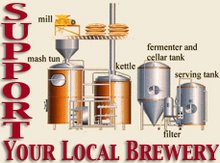Cape May Brewing ain't so little now
 |
| Chris Henke, Ryan Krill, Mark McPherson |
In most cases, those people take a lot of the knowledge of their previous occupations and vocations into their new beer careers.
And so it goes for the new faces at Cape May Brewing, New Jersey's southern-most brewery. Take Mark McPherson, who jumped into brewing from a family-owned concrete business, joining the brewery 14 months ago part-time – he's been full-time for 10 – as it ramped up for a big growth spurt.
"I'm local down here and heard about the brewery opening up. I met these guys and saw them brewing on a small scale," Mark says, standing just off the brewhouse, pausing from an early afternoon task of tending a mash.
 |
| Taproom bar |
 |
| Mark checking the kettle |
The brewery and its lineup of 10 draft-only ales has been growing rather exponentially since, taking over two more units of the small business park building it calls home beside Cape May County Airport.
The extra space houses a 4-barrel brewhouse picked up last year from a Maryland brewpub; some repurposed rectangular wine fermenters; a 30-barrel conical tank used as a bright tank; a cold box for kegged beer; and a new tasting room that features a 40-foot polished concrete bar with 12 taps hovering behind it. (The tasting/taproom is open five days a week, by the way.)
"My dad is going to be full-time here in the spring," says Ryan. "He's checking out of consulting. He's part-time now, comes down during the week and on the weekends when we need help in the taproom."
Those weekends have been big, with brewery tours drawing enviable crowds; they've been positively booming during the summer, a peak season for any business at the Jersey shore. But that summer success has spilled over into other parts of the calendar.
 |
| Count 'em: a dozen taps |
 |
| All roads lead to beer |
Ryan had planned to make the full-time jump this spring but did so last August and handles the distribution end of the brewery. "Every month our gross number has been increasing. Even though the summer has tapered off, it's just accelerating here for us."
Their list of draft accounts in Cape May County numbers 25 now and includes the Cape May-Lewes Ferry terminal. Their top-selling beer remains their Cascade-hopped IPA, but their seasonal honey porter sees high demand as well (a just-brewed barleywine will further their lineup; bomber bottles of special brews, like that barleywine, are also planned). Weekly production has surged, topping 20 barrels.
"It's not a consistent number for us, because we're still feeling things out," Ryan says. "We're gaining a number of new accounts. Even though that's a few accounts every week, as a percentage of the total, it's a lot for us. So we're still trying to feel out where we need to land for the winter."
Yet, that growth has meant the fledgling brewery needed more hands.
 |
| Taproom manager Danny Otero |
For Mark, 38, signing on at the brewery meant making a decision to leave the family business, McPherson Masonry, in Erma (a section of Lower Township where the brewery is located).
Peeling away from a family business where he was fourth-generation was a little stunning to his uncles, father and brother. But they were also impressed by the brewery and the realization of suddenly having a brewer in the family.
"It was a shocker," Mark says. "It was a shocker just to have a brewery in our area. The second big shocker was for me to be able to work in a brewery."
 |
| Cape May Brewing half barrels |
In fact, the most popular place in the operation is where you'll find some of Mark's handiwork: He built the tasting room bar.
"I did this section, too," he says, smiling and motioning to another part of brewhouse room. "I jackhammered out the concrete and put in the floor drains and repoured the concrete. I was a valuable asset. They needed a lot of concrete work."
There were advantages for McPherson Masonry, too.
"It alleviated a lot of the pressures, I believe, on the company, my coming here, one less mouth that my dad had to worry about," Mark says. "The housing industry has been very, very tough the past five years in Cape May County, because we're largely a tourist (area), a seaside resort. When the economy is bad, people don't vacation as much. They're not up to buying second homes or fixing up the second homes that they do have."












1 comment:
An excerpt from my snapshot bio of Garrett Oliver where he contemplates the burgeoning American craft beer scene and the struggling German beer scene.
"Garrett circles back around to the thought about creativity as the soul of American craft beer. He feels that whatever you were doing before you began brewing, you are going to use those skills again in brewing. He compares the American craft beer scene to what typically happens in a decision to enter the German brewing industry.
Garrett explains his feeling that the German beer industry is currently struggling because it is not populated with people who are on fire with a love of beer. He feels it could become that way someday for the German beer industry, but for now the world looks to the American craft beer industry for inspiration in brewing.
Garrett believes the inspiration that comes out of the American craft beer scene is largely due to the fact that it is a second or third act for many who pursue it."
Post a Comment